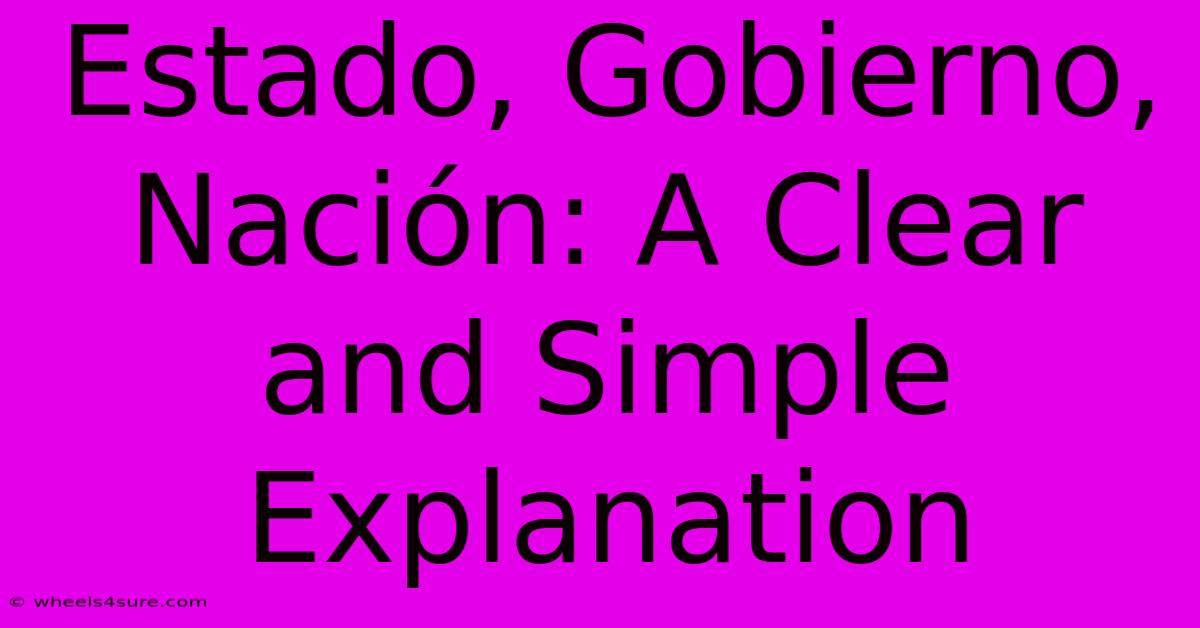Estado, Gobierno, Nación: A Clear And Simple Explanation

Table of Contents
Estado, Gobierno, Nación: A Clear and Simple Explanation
Understanding the differences between Estado, Gobierno, and Nación can be tricky, even for native Spanish speakers. These three concepts are often used interchangeably, leading to confusion. However, they represent distinct yet interconnected entities crucial to understanding political systems. This article will provide a clear and simple explanation of each, highlighting their key differences and relationships.
What is a Nación (Nation)?
A Nación refers to a group of people bound together by a shared identity. This identity can be based on various factors, including:
- Shared culture: Common language, traditions, customs, and values.
- Shared history: A collective narrative and historical experiences.
- Shared territory: A geographical area that the nation considers its homeland.
- Shared political aspirations: A desire for self-determination and autonomy.
It's important to note that a nation doesn't necessarily need a state to exist. Many nations are stateless, meaning they lack their own independent political entity. The Kurdish people, for instance, constitute a nation spread across multiple states without their own sovereign state.
What is a Estado (State)?
The Estado, or state, is a more concrete entity than a nation. It refers to a political organization with:
- Defined territory: Clearly demarcated geographical boundaries.
- Permanent population: A stable group of people residing within its territory.
- Government: A functioning political system with the authority to make and enforce laws.
- Sovereignty: The supreme authority within its territory, free from external control.
The state is characterized by its monopoly on the legitimate use of force within its borders. It is the entity that holds the power to tax, maintain order, and defend its territory.
What is a Gobierno (Government)?
The Gobierno, or government, is the organ of the state responsible for exercising its power. It's the group of individuals who actually run the state. The government is composed of institutions and individuals charged with:
- Formulating and implementing policies: Creating and enacting laws, regulations, and programs.
- Managing public resources: Allocating funds, overseeing infrastructure projects, and providing public services.
- Maintaining order and security: Enforcing laws, protecting citizens, and defending the state's borders.
The government is temporary; it can change through elections or other political processes. The state, however, is a more permanent entity, existing even if the government changes.
The Interrelationship of Estado, Gobierno, and Nación
The relationship between these three concepts is complex and often overlapping. Ideally, a state represents a nation, and the government works for the benefit of both. However, this is not always the case.
- Nation-state: This is the ideal scenario where a single nation occupies a state. Examples include Japan and France (although even these have internal ethnic or cultural divisions).
- Multinational state: A single state encompassing multiple nations. The United Kingdom, with its English, Scottish, Welsh, and Northern Irish identities, is a prime example.
- Stateless nation: As mentioned before, this refers to a nation without its own state.
Understanding the distinctions between Estado, Gobierno, and Nación provides a fundamental framework for analyzing political systems and understanding the complex relationship between power, identity, and territory. These concepts are vital for comprehending political dynamics on a global scale.

Thank you for visiting our website wich cover about Estado, Gobierno, Nación: A Clear And Simple Explanation. We hope the information provided has been useful to you. Feel free to contact us if you have any questions or need further assistance. See you next time and dont miss to bookmark.
Featured Posts
-
Gyanendra Shahs Age And His Political Future
Apr 05, 2025
-
Phil Mickelsons Net Worth A Closer Look
Apr 05, 2025
-
Sundar Pichai Net Worth A Closer Look At Googles Head
Apr 05, 2025
-
Branko Babic His Net Worth And Charitable Contributions
Apr 05, 2025
-
Que Son Las Adivinanzas Learn The Secrets Of Riddles
Apr 05, 2025
